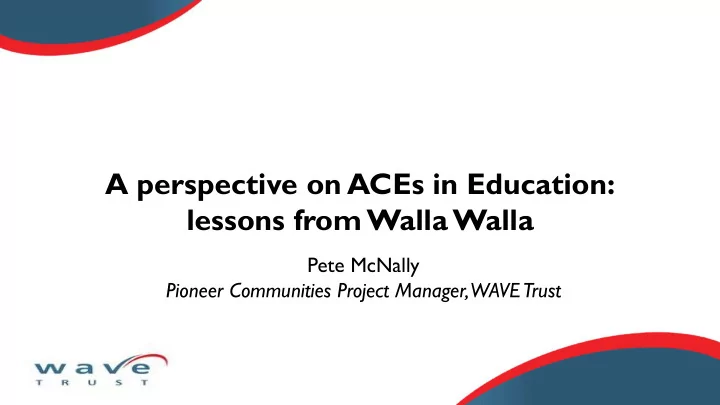

A perspective on ACEs in Education: lessons from Walla Walla Pete McNally Pioneer Communities Project Manager, WAVE Trust
Our agenda 1. An introduction to WAVE Trust 2. Why Walla Walla? 3. Focus on Lincoln High School 4. Key lessons from Walla Walla 5. Trauma-informed schools outside Walla Walla 6. Discussion
WAVE Trust • ACE prevention • The first 1001 days • Pioneer Communities • 3-Nation ACEs Network • 70/30 Prevention Campaign
Why Walla Walla?
Why Walla Walla?
An overview of ACEs work in Walla Walla
Focus on Lincoln High School
Focus on Lincoln High • ACEs movement started in Walla Walla by community coalition called Children’s Resilience Initiative • The group enrolled key stakeholders in their movement, including Lincoln High staff • They provided school staff with training and direction to become ACE- aware • Previously an alternative school (equivalent to EOTAS) • Transformed in to most popular school in region through ACE- awareness and trauma-sensitivity
Focus on Lincoln High • They start by building relationships with the students – trust, transparency, feeling of being ‘on their side’ • Teachers accept that poor behaviour is probably a response to something else in student’s life • Teaching methods adapted for students’ needs • Students who have time and space to process emotion are much more able to learn • Resilience = solution to discipline
Focus on Lincoln High • Disciplinary methods much less punitive, more about helping students identify and control emotions • Look into underlying causes of behaviour • Pupils not screened for ACEs – it is assumed they require trauma- sensitive care • Ask not ‘what’s wrong with you?’ or ‘why did you do that?’, but ‘what’s happened to you?’ or ‘what are you going through?’ • Specialist staff on-site to help students to cool down, regulate emotions, and attain stability and safety
‘Resilient: the school discipline revolution in Walla Walla’
Picking out a few key lessons from Walla Walla
Lessons from Walla Walla 1. Put into practice the prioritisation of students’ wellbeing and rounded development 2. Manage behaviour in a collaborative and supportive way 3. Establish and make use of cooperative relationships with other agencies
Lessons from Walla Walla 1. Put into practice the prioritisation of students’ wellbeing and rounded development • Prioritise students’ safety, stability, trust and relationships, collaboration, and the emotional and social needs of children • Reflect these by talking about brain development, practising mindfulness together, and providing a facilitative physical environment • Understand that conventional schooling can exacerbate trauma’s effects, and actively cause harm and re-traumatisation • Respond to this by sending students to spaces/clinics where they can rest, re- teaching lessons, postponing testing, and referring to counselling
Lessons from Walla Walla 2. Manage behaviour in a collaborative and supportive way • Train staff to interpret students’ behaviour as a way of communicating and as symptomatic of deeper root causes • Focus on understanding and recovery rather than punishment • Use expulsion in only the most extreme cases where no alternatives exist • Employ a behavioural intervention specialist whose role is to help stressed students and try to provide stability in living and learning circumstances
Lessons from Walla Walla 3. Establish and make use of cooperative relationships with other agencies • Maintain dialogue and feedback with physical and mental health services. Co- locate if possible, or facilitate regular visits and check-ups • Invite police to have a presence in schools from early years in order to encourage good relationships and emphasise police role of support • Set up a system whereby emergency services alert school whenever a student suffers an ACE/trauma event • Provide or facilitate family counselling sessions, therapists and crisis intervention specialists
TI schools outside Walla Walla
TI schools outside Walla Walla • Menominee Tribe in Wisconsin integrated trauma-informed practices and ACEs science into high schools (inc. historical trauma) – Graduation rates have risen from 60% to 99% – Cannabis use down 30%, cigarette use down 49%, alcohol use down 64% • Schools in Dalles, OR focus on after-school programmes, mental health and crisis intervention across school ages – Expulsion now much less common – Where it does occur: multi- agency involvement, focus on ‘what’s happened’ to the child, always accompanied by plan for child and family – Students report less alcohol use, fewer physical fights, heightened feelings of safety
TI schools outside Walla Walla
Discussion
Recommend
More recommend